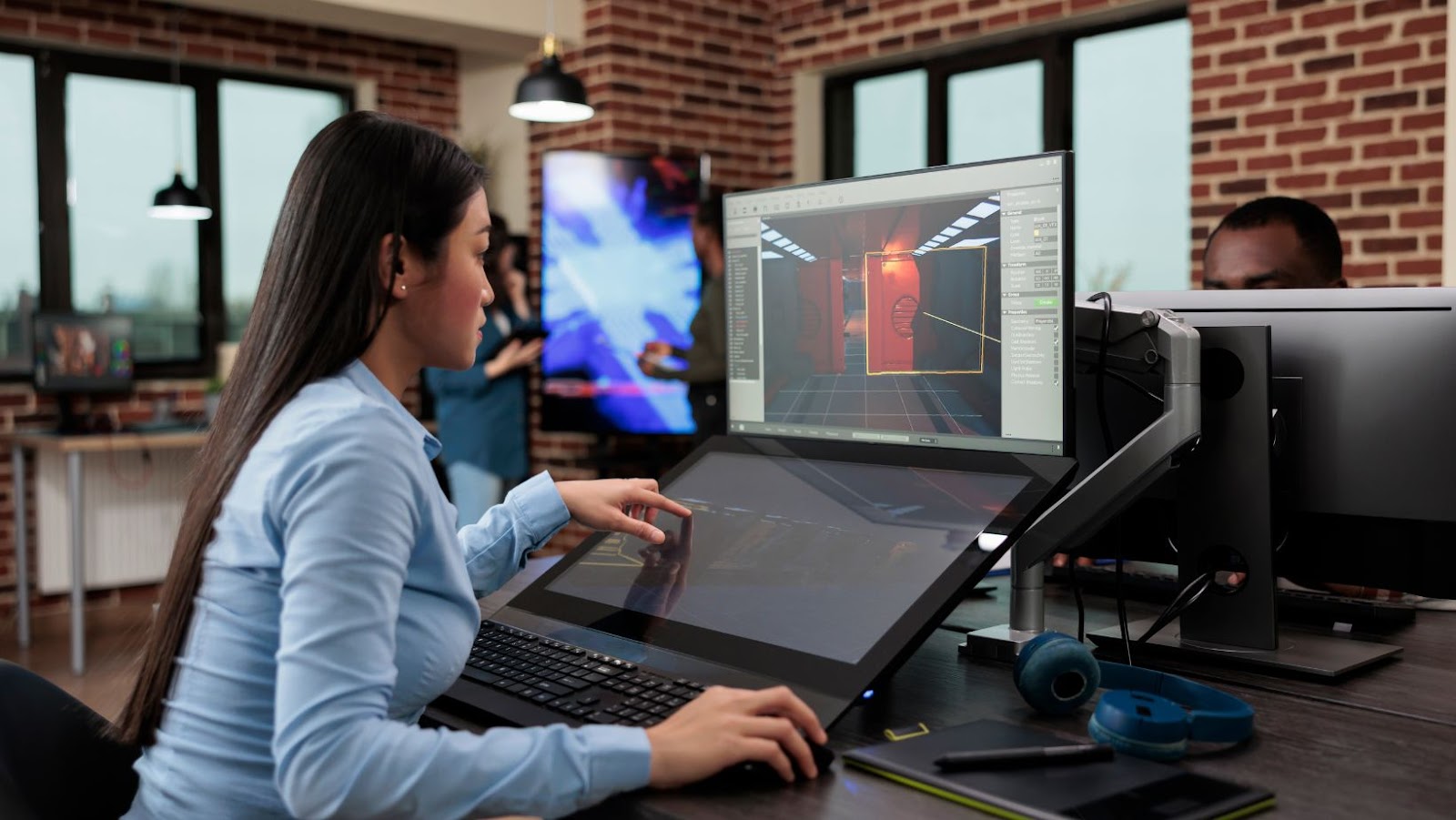 Game Development Trends
Game Development Trends
Mobile gaming has marked its prominence in recent game development trends. Signifying a major shift in the gaming industry, it now occupies a crucial position in players’ lives. Statista reports, as of 2021, mobile games accounted for 56% of the global games market revenue, indicating a pronounced inclination towards the handheld gaming experience. This surge is mainly influenced by increased smartphone ownership, improved internet connectivity, and the popularity of free-to-play gaming models. Analyzing real-world examples sheds more light: games like Pokémon Go, PUBG Mobile, and Among Us have hooked millions of players worldwide, highlighting mobile gaming’s ever-growing user base
The game development trend chart seldom falls short on surprises; Virtual Reality (VR) gaming is one such trend refusing to fade. The VR market’s expansion is led by interactive gaming experiences that were far from reality a few decades ago. Newzoo estimates that the consumer VR market will reach $5.1 billion in 2021, signifying a growth rate of 34.3% from 2020. At the heart of this growth exists innovative VR devices like Oculus Rift, HTC Vive, and PlayStation VR, which have been propelling VR gaming to new heights. Exemplar games such as Beat Saber and Half-Life: Alyx demonstrate how compelling virtual environments can redefine gaming experiences.
 Understanding the Impact of AI on Game Development
Understanding the Impact of AI on Game Development
Artificial Intelligence (AI) plays a paramount role in shaping modern game development, transforming how games are designed, characters are created, and environments are constructed. The integration of AI promises more immersive, interactive, and personalized gaming experiences.
AI redefines game design by augmenting adaptability, creating dynamic and responsive experiences, not predetermined by static scripts. Adaptive game design implemented through AI ensure unique gameplay, catering to personalized player preferences. For instance, titles such as Left 4 Dead and Alien Isolation use AI systems known as the ‘AI Director’ and ‘the Alien,’ respectively, to monitor player behavior and adapt the game environment, delivering a unique and unpredictable gameplay experience each time.
AI-based technology also revolutionizes character and environment creation, streamlining processes and enhancing realism. Techniques such as semantic segmentation and machine learning algorithms enable AI to auto-generate realistic characters and environments, speeding up production while maintaining high-quality graphics. A notable example is Promethean AI, a technology that assists artists in creating detailed virtual worlds in seconds. It absorbs contextual inputs from developers, produces various design outputs, and the creative team chooses or modifies the desired version, cutting down development time significantly.
After preceding advancements in mobile, virtual reality, and AI-driven gaming trends, the sector witnesses yet another transformation – cloud-based gaming. It’s a rising trend, paving the way for more accessible and efficient gaming experiences.
The demand for cloud-based games shoots up significantly. A report by Allied Market Research indicates that the global cloud gaming market poised to reach $56.57 billion by 2027, showing a CAGR of 15.7% from 2020 to 2027. It’s ready to embrace vast opportunities following the ease of use, affordability, and continuous updates it offers. Players no longer require expensive hardware to enjoy top-notch games, as they can play their desired games directly from cloud servers regardless of their device’s specifications.
 Role of Blockchain in Gaming Industry
Role of Blockchain in Gaming Industry
Shining a spotlight on another significant trend in the gaming sector—Blockchain—it’s evident that this technology has started to make waves in gaming circles. Blockchain’s decentralized and secure nature offers numerous potential applications in the gaming industry, ranging from cryptocurrency use to combating piracy.
In the gaming universe, the introduction of cryptocurrency has emerged as a novel way to enhance gaming transactions. Known for its decentralization, cryptocurrency eliminates the need for intermediaries, allowing players to perform seamless cross-border transactions. For instance, “Enjin Coin,” a cryptocurrency specific to the gaming industry, enables developers to carry out quick and reliable in-game transactions, thereby driving increased player engagement.
Beyond just transactions, Blockchain proves its potential in the gaming field by fortifying the battle lines against piracy—a recurring nemesis in the gaming world. By providing a reliable proof of ownership, Blockchain technology ensures genuine copies of games are in circulation. As an example, Decentraland, a Blockchain-based game, safeguards its assets and prevents illegal copying through its distributed ledger technology. As such, protecting intellectual property rights becomes feasible, uncompromising the developer’s hard work and the industry’s commercial sustainability.